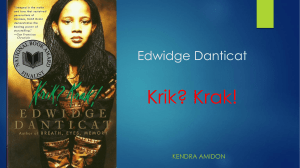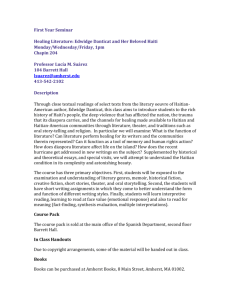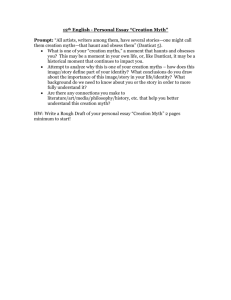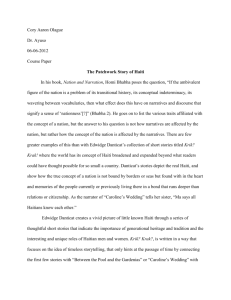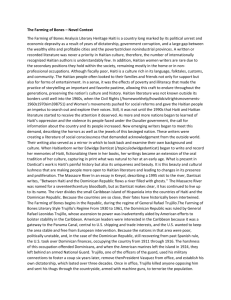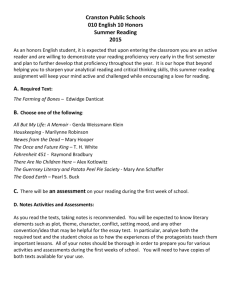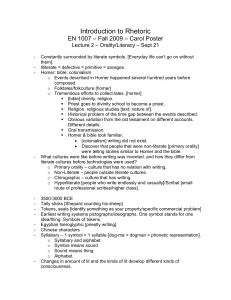Literature 1 Orality as Inheritance in Edwidge Danticat's Krik? Krak
advertisement
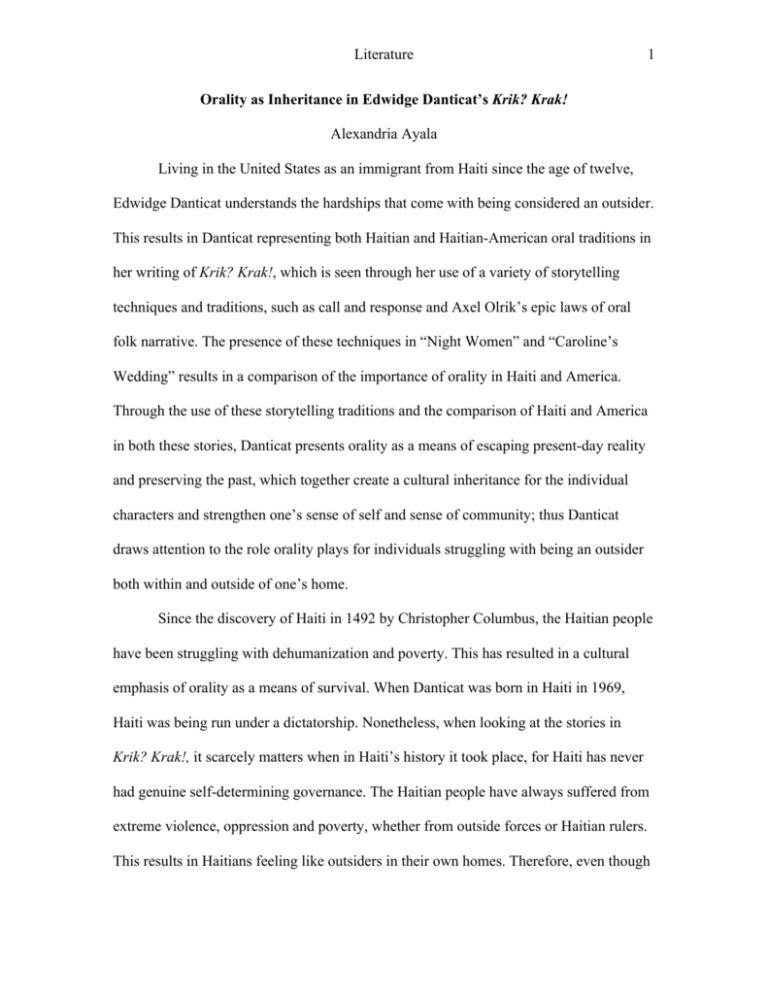
Literature 1 Orality as Inheritance in Edwidge Danticat’s Krik? Krak! Alexandria Ayala Living in the United States as an immigrant from Haiti since the age of twelve, Edwidge Danticat understands the hardships that come with being considered an outsider. This results in Danticat representing both Haitian and Haitian-American oral traditions in her writing of Krik? Krak!, which is seen through her use of a variety of storytelling techniques and traditions, such as call and response and Axel Olrik’s epic laws of oral folk narrative. The presence of these techniques in “Night Women” and “Caroline’s Wedding” results in a comparison of the importance of orality in Haiti and America. Through the use of these storytelling traditions and the comparison of Haiti and America in both these stories, Danticat presents orality as a means of escaping present-day reality and preserving the past, which together create a cultural inheritance for the individual characters and strengthen one’s sense of self and sense of community; thus Danticat draws attention to the role orality plays for individuals struggling with being an outsider both within and outside of one’s home. Since the discovery of Haiti in 1492 by Christopher Columbus, the Haitian people have been struggling with dehumanization and poverty. This has resulted in a cultural emphasis of orality as a means of survival. When Danticat was born in Haiti in 1969, Haiti was being run under a dictatorship. Nonetheless, when looking at the stories in Krik? Krak!, it scarcely matters when in Haiti’s history it took place, for Haiti has never had genuine self-determining governance. The Haitian people have always suffered from extreme violence, oppression and poverty, whether from outside forces or Haitian rulers. This results in Haitians feeling like outsiders in their own homes. Therefore, even though 2 Danticat does not state specifically when it takes place, the story of “Night Women” comments on the importance of orality in times of struggle and dehumanization. At the start of the story, the mother describes her and her son’s apartment as “two spaces, two mats, two worlds” (83). In these words, Danticat utilizes Axel Olrik’s law of repetition to create a tension within the mother and son’s apartment. The repetition of “two” merely emphasizes the words that follow: “spaces,” “mats,” and “worlds.” The term “spaces” usually refers to a single entity or a specific distance. This gives the idea that by “two spaces” the mother means that there is a distance between her and her son; however, it does not imply whether this is because of the largeness of their apartment or something else. When the mother follows this with “mats,” she is taking back any positive attributes that “spaces” may have accentuated. “Mats” imply individual ownership. This results in the creation of a physical distance between her and her son. This is later emphasized when the mother speaks of the curtain she uses to divide the room. “Worlds” then broaden the mother’s descriptions. This creates a greater, and more emotional, distance between her and her son by claiming that they are from two different places, or rather two different worlds of understanding. Axel Olrik explains repetition as usually being “accompanied by progressive ascent” (44). The progressive ascent in this repetition from “two spaces” to “two mats” to “two worlds” creates a tension within the mother and son’s living situation. The mother is struggling to survive while living in a state of oppression, whereas the son is in a state of naivety and innocence. This is Danticat’s way of making the reader understand the need for alternative realities in times of struggle. Aquila: The FGCU Student Journal Vol. 1 2014 3 The tension between the mother and son’s living situation only grows when Danticat employs Olrik’s law of contrast, which is most clearly seen when the mother compares day women to night women. The mother deems herself “stuck between the day and the night” (84). The contrast in this description draws attention back to the apartment representing two worlds. For the mother, she is a day woman on the side of the apartment where her son is because this is the space where she fulfills a traditional Haitian female role as a mother. However, on the side of the apartment where she works as a prostitute, she is a night woman, doing what she has to in order to survive. The tension created through this contrast draws attention to her relationship with her son. The bedtime stories that she tells him are oral folktales that she uses so he will learn to dream beyond his current circumstances. The mother also uses the stories to help her son connect to the oral traditions of their Haitian culture. As he gets older, these stories will influence the way that he reflects on his childhood and how he sees his future, which, together, will affect his sense of self, place, and belonging. Through the use of orality, the mother in “Night Women” creates an alternative reality for her son. The mother does not only make this choice to provide her son with a distraction from what her and their situation is; she uses specific oral narratives to provide her son with a sense of hope and a stronger sense of self. At night, before her visitors come, the mother tells her son stories full of magic: I whisper my mountain stories in his ear, stories of the ghost women and the stars in their hair. I tell him that if I cross a stream of glass-clear hibiscus, I can make myself a goddess, I blow on his long eyelashes to see if he’s truly asleep. My fingers coil themselves into visions of birds on his Aquila: The FGCU Student Journal Vol. 1 2014 4 nose. I want him to forget that we live in a place where nothing lasts. (Danticat 86) The mother’s emphasis that the mountain stories are hers shows how she is trying to share her cultural identity with her son. The actual stories that the mother tells her son of “ghost women,” “[hats] full of gold,” and her ability to “make [herself] a goddess” create an alternative reality for her son full of dreams, hope, and endless possibilities. The metaphor of her fingers coiling into “visions of birds on his nose” further emphasizes the mother’s attempt at providing her son with dreams and possibilities, even if they are magical, so that he can understand that there are more than just struggles in the world. Thus, Danticat is proving the high level of significance orality can have on an individual. Despite this, because Danticat ends the novel with the mother, she reminds the reader of the fundamental subject of “Night Women”: the mother. By emphasizing the mother’s struggles, Danticat draws attention to the mother’s effort to impact her son positively through stories. The last line of “Night Women” reads, “Darling, the angels have themselves a lifetime to come to us” (88). The reference to “angels” is the mother referring to the stories she tells her son of magic and hope so that he will be able to find those things in everyday life outside the alternative reality she has created for him. Through this, Danticat is commenting on the importance of orality for all Haitians. Haitians use orality as a means of escape, a means of passing down their culture, and a means of providing hope. The orality in “Night Women” acts as a middle ground for the transition from dehumanization to hope. This orality, or tales, are acted out by the storyteller, or the mother, and creates a call and response effect on the story. The transition from Aquila: The FGCU Student Journal Vol. 1 2014 5 dehumanization to hope via orality mirrors the transition that occurs from storyteller to listener in the title of the collection, Krik? Krak! “Krik” symbolizes the question a storyteller asks an audience, the question of whether they are ready to hear a story. “Krak” embodies the listener’s reply: I am ready to hear your story. This back and forth between the storyteller and the listener appears as a foundation in Danticat’s stories. In “Caroline’s Wedding,” the call and response technique is evident in the narrator’s interaction with her parents, i.e., her storytellers. Despite this, the transition from storyteller to listener is reversed in “Caroline’s Wedding.” The story begins with the parents as the storytellers; however, this role reverses by the end of the story when the narrator, Grace, takes on that storyteller role. The use of this call and response technique demonstrates the power of orality as a means of survival. In the story “Caroline’s Wedding,” Danticat emphasizes the same significance of orality as she did in “Night Women,” but in this story, she applies this to the experience of Haitian-Americans. She does this by employing a narrator who is struggling to define her identity as a Haitian in America. Tension is created as the narrator’s mother is unwavering in her Haitian traditions, and her sister, Caroline, is unwavering in her American traditions. In an interview with Ann Scarboro, Danticat explains that “to be called Haitian-American is just coming together… [they are] people transitioning from one culture to the next.” Danticat also speaks of how this is a bridging of times. It is comparing and remembering who “we” are now to how “we” were then (Scarboro). Thus, when this concept is applied to the story of “Caroline’s Wedding,” the mother in the story represents who her daughters, and thereby all Haitian women “were,” while Caroline represents a version of what Haitian women sometimes become in America. Aquila: The FGCU Student Journal Vol. 1 2014 6 Throughout this story, the narrator, Grace, is caught between her mother’s Haitian traditions and Caroline’s American traditions. When describing her mother, Grace constantly uses the phrases “my mother believes” and “ma believes.” This creates a distance between Grace and her mother because she is separating herself as not being a part of Haitian traditions as they belong to her mother. Grace does the same thing when she comments on Caroline’s practice and worship of American customs; she keeps herself somewhat separated from them, as if she does not belong. This is Danticat’s way of using Olrik’s law of contrast to create a polarization between Haiti and America. This is further emphasized in the contrast between Eric, Caroline’s fiancé, and the father of Caroline and Grace. When faced with the fast approaching wedding of Caroline and Eric, the mother condemns not only the union but also Eric himself. Ma wanted Eric to officially come and ask her permission to marry her daughter. She wanted him to bring his family to our house and have his father ask her blessing. She wanted Eric to kiss up to her, escort her around, buy her gifts, and shower her with compliments. Ma wanted a full-blown church wedding. She wanted Eric to be Haitian. (Danticat 169) The repetition of “Ma wanted” in this passage stresses the same separation and distance that Grace creates in her use of “my mother believes” and “ma believes.” The emphasis on her mother’s desires for Eric highlights the divide between Haitian and American traditions. However, because this is in the voice of Grace and not the mother, it is clear that Danticat is not criticizing America, but merely drawing attention to the differences in culture. The result of this is the reader recognizing the importance and struggle for many Haitian people in maintaining their cultural identity, even and especially when they are in Aquila: The FGCU Student Journal Vol. 1 2014 7 a completely different country. In Grace’s situation, she is surrounded by two polarized people that merely confuse her more in regards to her sense of self and place. The feeling of being an outsider in both Haiti and America looms over all of the characters and events in “Caroline’s Wedding.” Grace appears to place America on a pedestal as somewhere with more freedom and less struggle than Haiti. However, it is Grace’s father who truly represents Haiti and its traditions, yet the emphasis he placed on orality stays with Grace after his death. In both her memories and her dreams of her father, he plays the role of a storyteller, using the tradition of call and response through tales, riddles, songs, and jokes. Grace believes that “beneath the surface of [her] Papa’s old proverbs was always some warning” (173). Grace’s classification of her father’s tales and riddles as proverbs illustrates the level of regard in which she held her father. By saying that her “Papa...was always…warning” her, Grace is bestowing a power onto her father as being the holder of a level of Haitian culture that she will never be able to fully grasp. This disconnection that Grace appears to have with her birthplace and what should be her home, Haiti, draws the reader’s attention back to the difficulty in maintaining a sense of belonging when one is cut off from the society in which they feel they belong. The struggle that comes with feeling cut off from Haiti while living in America is presented to the reader frequently through Grace’s interactions with both her sister and her mother. For Grace, it is not just her father who represents Haiti and its culture, it is her mother. At the same time, Grace’s sister, Caroline, is the epitome of everything their mother believes to be wrong with Haitian girls who become American. They lose their cultural identity while trying to define a sense of home in a foreign land. The result is a demonstration of how much orality affects an individual’s sense of self and belonging. At Aquila: The FGCU Student Journal Vol. 1 2014 8 the end of “Caroline’s Wedding,” Caroline marries Eric and moves out of Grace and her mother’s home. This results in both Grace and her mother feeling a sense of a loss of community. However, orality pulls them together and brings their sense of community back to the surface. Grace comes home to find her mother seemingly happy because she “knows” Caroline would miss them, eliciting the following response. “Can I drop a bone in your soup?” I asked Ma. “It is your soup too,” she said. She let me drop one bone into the boiling water. The water splashed my hand, leaving a red mark. (Danticat 215-216) In this passage, the soup can be seen as a metaphor for orality. Since Grace and Caroline were children, their mother made this bone soup and fed it to them with words, stories, and riddles from Haiti. By asking to add a bone to the soup, Grace is asking her mother permission to be a part of this Haitian tradition of orality and storytelling. The mother responds by explaining to Grace that it is her tradition too; she is also Haitian. When the water leaves a red mark on Grace’s hand, this shows the reader how orality affects the ways in which an individual defines themselves because orality represents culture. The last lines in the story are the result of Grace and her mother playing a Haitian free association game: Her mother asked, “Why is it that when you lose something, it is always in the last place you look for it?” Grace responded with “Because of course, once you remember, you stop looking” (Danticat 216). The “something” Grace has sought throughout this story is her identity. Her mother represents Haiti and her sister represents America, but her own sense of self was lost in her attempts at intertwining these two cultures. By the end of the short story, Grace Aquila: The FGCU Student Journal Vol. 1 2014 9 appears to have found her sense of self and belonging. Her community is her home; it is made up of her mother, Caroline, and herself. Grace’s sense of self has been defined after Grace allowed herself to welcome in the orality of her parents and their Haitian culture. The need for orality lies in its power to provide individuals with a better sense of self and belonging. Danticat demonstrates this in these two short stories. Whenever the author is asked about why she loves and/or chooses to write, she responds by crediting orality because it has the ability to connect people with the past and provide an individual with a stronger, more defined, cultural identity. In an interview with Ann Scarboro, Danticat speaks of why and how she wrote the particular story of “Night Women.” Her reply was that she wrote it in one shot, and her reasoning for doing so was because she “felt like there was someone leaning over and whispering [the story] in her ear” (Scarboro). This is the same manner in which the mother, the narrator in “Night Women,” tells her son stories. Because she is a prostitute living in a one-room apartment with her son, she “[whispers her] mountain stories in [her son’s] ear” so that he will “forget that [they] live in a place where nothing lasts” (86). In “Caroline’s Wedding,” even though Grace’s father is dead, her memories of his stories act like whispers in her ear. The role of the parent in both of these stories is one that echoes the tradition of call and response. The son in “Night Women” and Grace in “Caroline’s Wedding” both respond to their parents’ stories. The tales, riddles, and proverbs that the mother in “Night Women” and the parents in “Caroline’s Wedding” share with their children act as a means of preserving the past by passing it down as a form of inheritance, and these stories also provide the children with a world of hope and possibilities that acts as a means of surviving struggles. Aquila: The FGCU Student Journal Vol. 1 2014 10 When the short stories of “Night Women” and “Caroline’s Wedding” come together, they speak to the transnational power of orality. Together these short stories show the reader how orality is used to define and maintain one’s cultural identity. The characters in “Night Women” illustrate how one defines an identity when they are living within the country that they identify as “home.” The characters in “Caroline’s Wedding” demonstrate the struggle that comes with defining an identity when one is between two cultures. It is the orality of Haitian culture that helps the characters in each story to form an identity. This connection that orality creates brands it as a necessity. Without orality, one cannot have culture, and without culture, one’s identity is left incomplete. Works Cited Danticat, Edwidge. Krik? Krak! New York: Vintage Books, 1996. Print. Olrik, Axel. Principles for Oral Narrative Research. Bloomington: Indiana University Press, 1992. Print. Scarboro, Ann A., Susan Wilcox, and Edwidge Danticat. Edwidge Danticat Visits Her Haitian Roots, June, 2003. Boulder, CO: Mosaic Media Arts, 2006. Aquila: The FGCU Student Journal Vol. 1 2014
